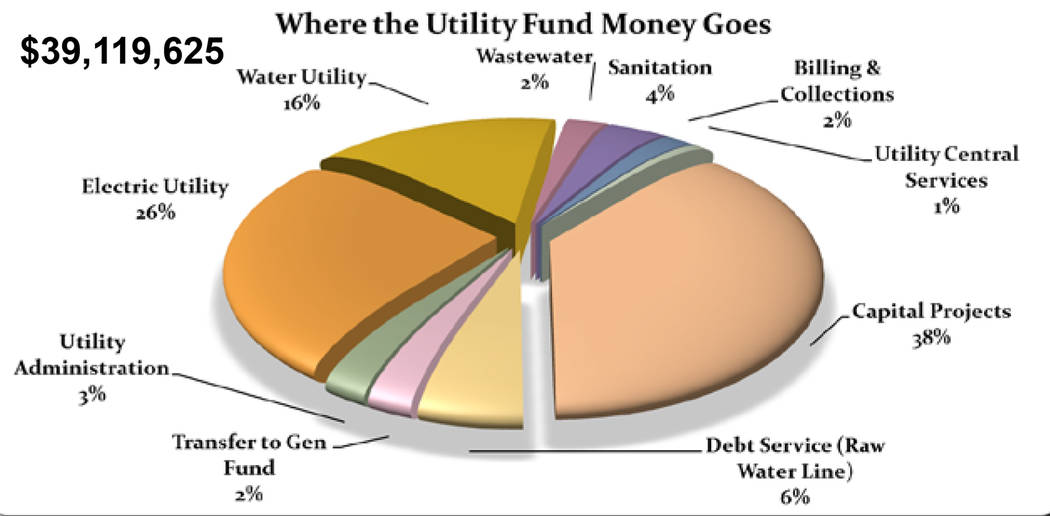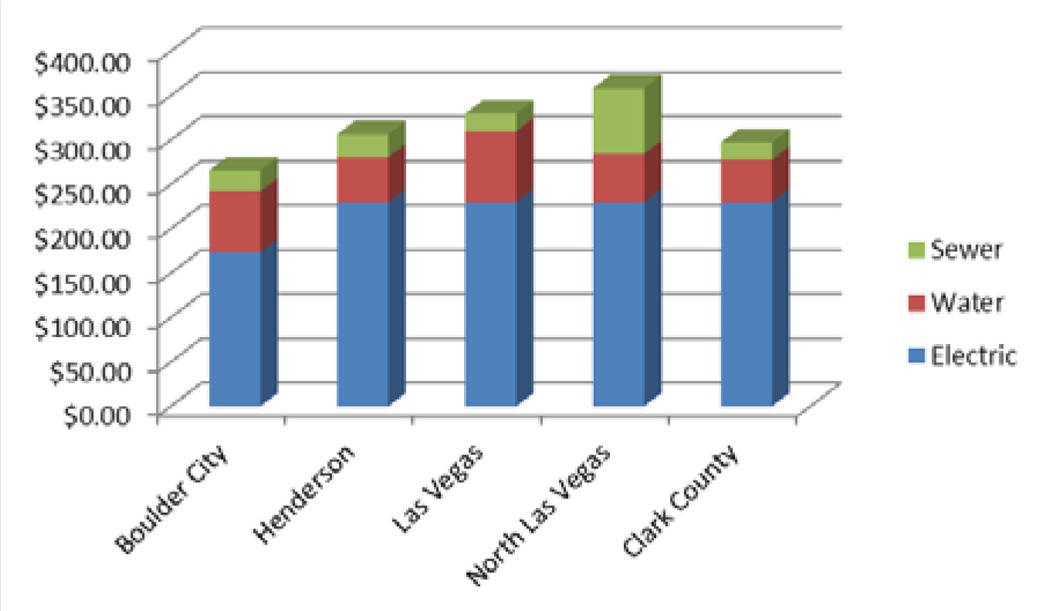Officials discuss utility upgrades; budgets $39.1 million for operations
Upgrades to the city’s utilities were the primary focus of a nearly three-hour budget workshop held March 15.
Much of the City Council members’ discussion revolved around plans to install a 69kV transmission line to prevent extended power outages as they considered the proposed $39.1 million utility fund budget.
Finance Director Diane Pelletier presented an outline of the budget to start the meeting, and discussion quickly turned to the 1.6 mile-long 69kV transmission loop.
The line will serve the northern portion of the city and will create a second option in case of failures. All substations serving the southern part of the city currently have a second transmission line.
A 2015 study commissioned by the city proposed the best alternative route for the lines would be to run from Substation 3 near the east end of Adams Boulevard along Nevada Way to U.S. Highway 93, ultimately ending at Substation 6 near Hemenway Valley Park. The lines would run by a few homes in the Tuscany subdivision.
Estimated costs were $1.8 million if the lines were overhead or around $5 million if the portion near the homes were put underground, said Scott Hansen, the city’s public works director, who also served as acting city manager when the proposed budget was created.
Councilman Rich Shuman questioned whether all alternative routes for the lines had been considered.
Rory Dwyer, the city’s electrical utility administrator, said they looked into multiple alternatives, including paying NV Energy to use its lines as a backup system. He said that option would cost the city a base fee of $800,000 plus electricity.
His biggest concern was that the system was “on the same line as our own line. There’s a 99.9 percent chance it will go down if our line goes down.”
“If you compare that to the costs of the overhead lines, we will just burn through that in about two and a half years,” said Mayor Rod Woodbury.
Councilman Warren Harhay, who attended the meeting by teleconference, expressed his concerns about the number of homes that would be affected by the additional costs of putting the lines underground and the value that added to the city.
Hansen said four or five homes on Nevada Way would be in close proximity to the transmission lines and power poles. Dwyer added that the lines would not directly abut any of the homes, because they would be across the street.
Woodbury said there was the possibility of establishing a special improvement district to help offset the costs of putting the lines underground. Councilwoman Peggy Leavitt said the added costs of maintaining those lines also must be considered.
“They are most expensive to maintain and to find and detect issues,” she said.
“You rarely see this across the United States,” Dwyer said of underground lines of this type. “It benefits very few, and there is a cost to those who don’t benefit from the aesthetics.”
In the end, the council unanimously recommended to direct staff to create requests for proposals to install the 69kV transmission loop with overhead as well as underground options, so the members can base their decision on more realistic numbers.
This would also provide additional opportunities to get public comments on the project.
Rate hike deferred
The budget also called for deferring rate increases for water and sewer usage from July 1 to Oct. 1. Hansen said the deferral was based on feedback from the community.
Last year’s electrical rate increase came as temperatures soared, causing usage to rise, and many residents were shocked at the difference in their utility costs.
The council also discussed the transfer of $1 million from the capital improvement fund to the general fund. The voter-approved transfer will pay for new designs for improvements at the fire department, public works shop, Boulder Creek Golf Club pavilion and City Hall customer service, along with secure parking for the police station and a municipal court addition, Pelletier said.
Councilman Kiernan McManus said he was especially concerned with transfers between the various funds and felt that personnel costs for public works, the city engineer, electrical utility administrator and those in the water/sewer division should come directly from the utility fund.
“I believe the utility fund should stand on its own,” he said.
In response, Woodbury said there are personnel who work on projects that would be paid for by both the general and utility funds, and the city benefits from sharing employees.
McManus also questioned the need for a Redevelopment Agency utility reserve account. Hansen said the fund was established to pay for utility projects in the redevelopment area.
Before closing the meeting, Pelletier mentioned a few changes to the proposed $33 million general fund budget, including hiring an additional police dispatcher and police sergeant, as well as the $50,000 increase in salary for the new city manager.
Leavitt and McManus said they would like to see better accounting of the number of people being hired and how this compares with department head requests that were not funded.
Shuman said that, before approving the final budget, he would like to see how much money was actually spent last year versus projected costs and the percentage of those changes. He also requested budget summaries, including capital projects, from the past few years to get a comparison of costs and increasing expenses, as well as a priority list of projects for the coming years.
New City Manager Al Noyola said typically staff should provide monthly statements so that council members can see what was actually spent versus what was budgeted.
The discussion will impact the tentative budget, which must be submitted to the state by April 15. The final budget for fiscal 2018-19 will be approved in May.
Hali Bernstein Saylor is editor of the Boulder City Review. She can be reached at hsaylor@bouldercityreview.com or at 702-586-9523. Follow @HalisComment on Twitter.

















